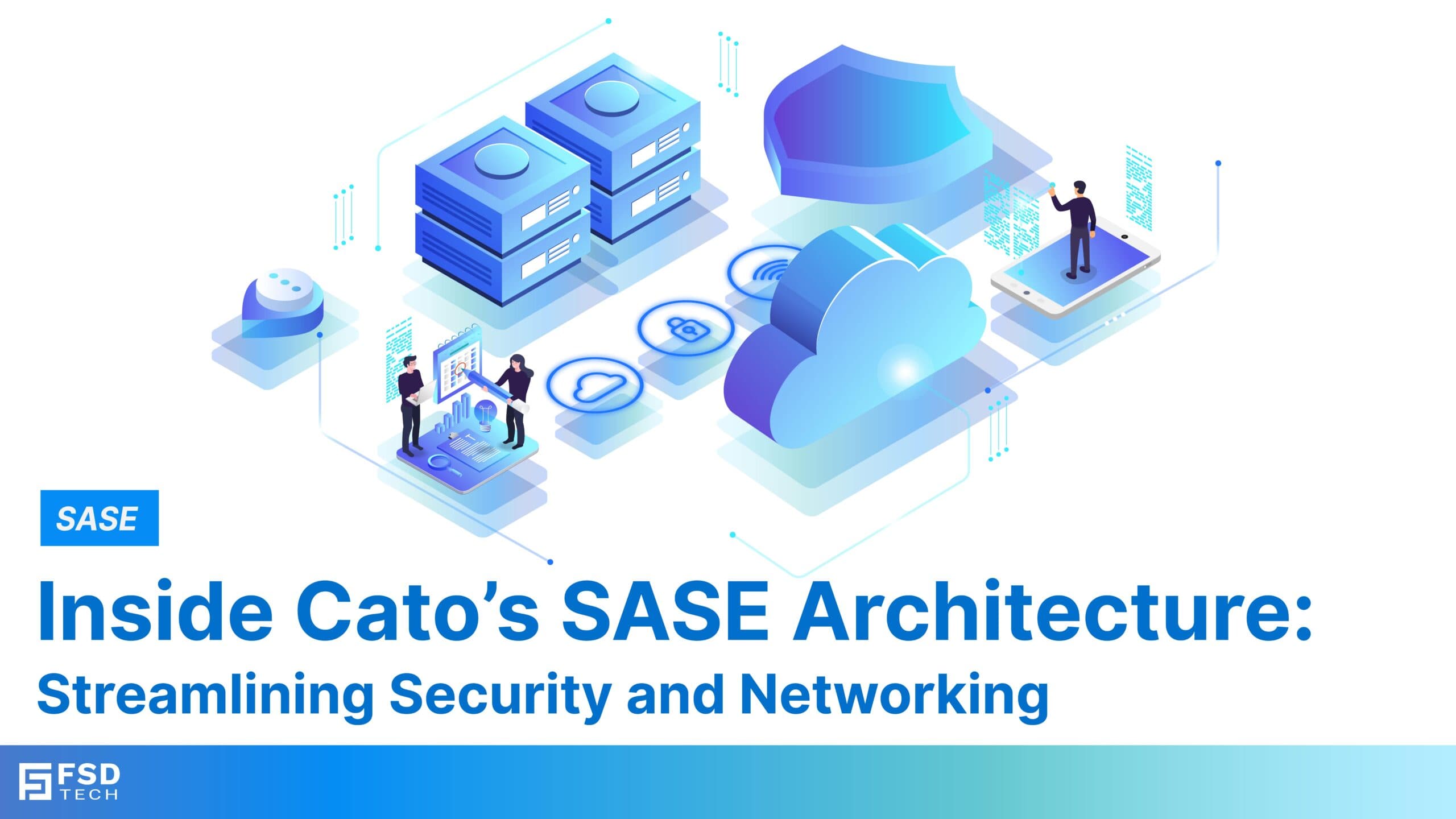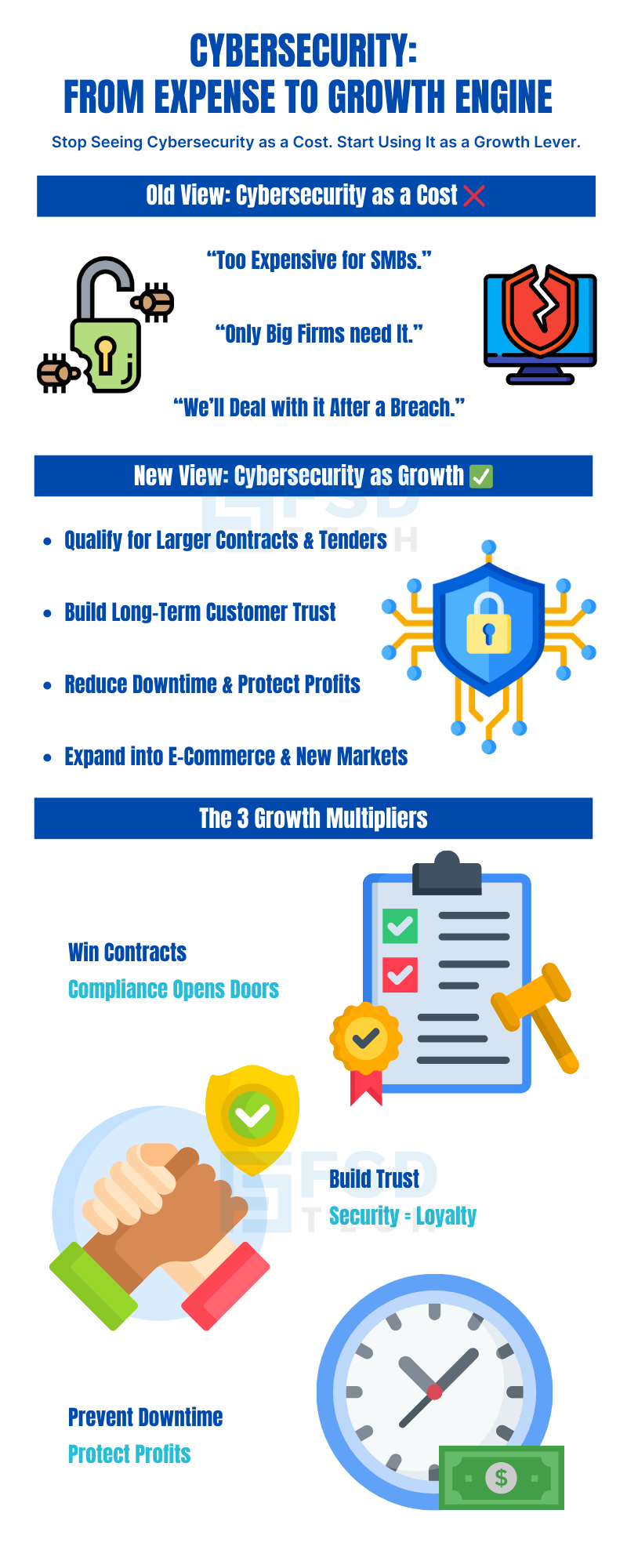
Inside Cato’s SASE Architecture: A Blueprint for Modern Security
🕓 January 26, 2025
%20Why%20Cybersecurity%20Is%20a%20Business%20Growth%20Strategy-01.jpg&w=3840&q=75)
Ask any small or mid-sized business (SMB) owner in GCC or Africa about cybersecurity, and you’ll likely hear the same response:
“It’s expensive. It’s complicated. It’s something only the big companies really need.”
For many years, cybersecurity has been seen as a necessary evil — a cost that doesn’t add visible value.
But here’s the hidden truth: cybersecurity is no longer just about avoiding loss.
It has evolved into something much bigger → a business growth strategy.
SMBs who understand this are not only surviving but also growing faster than their competitors.
In this extended article, we’ll explore why cybersecurity is more than a defensive wall. It is:
✔ A growth accelerator.
✔ A trust builder.
✔ A passport to new contracts.
✔ A shield against downtime.
And most importantly → it’s now an affordable and scalable investment, thanks to modern models like MSSP (Managed Security Services Provider) offered by FSD-Tech.
Let’s start with the mindset problem.
For years, SMBs in GCC & Africa treated cybersecurity as:
This “cost view” leads to dangerous behaviors:
The result? SMBs become the easiest targets for hackers.
Statistics show that:
43% of cyberattacks target SMBs.
Average cost of a breach for SMBs: $50,000–$200,000.
60% of SMBs shut down within 6 months of a major cyber incident.
Clearly, treating cybersecurity as a “cost” is one of the biggest risks SMBs face today.
Now let’s flip the perspective.
Smart SMBs in GCC & Africa are realizing that cybersecurity:
In this view, cybersecurity isn’t money lost — it’s money multiplied.
It’s not just about defense. It’s about enabling confidence and trust.
Ali owns a logistics firm in Riyadh.
He had the chance to apply for a lucrative shipping contract with an international oil company.
Everything looked good until the due diligence process began. The client asked for:
Ali had none of these.
No MDR (Managed Detection & Response).
No SOC (Security Operations Center) reports.
No Zero Dwell technology to stop advanced threats.
Result? The oil company rejected his proposal. He lost a multi-million-dollar growth opportunity.
Ali realized cybersecurity wasn’t optional anymore.
He turned to FSD-Tech’s MSSP services, which gave him:
✔ EDR (Endpoint Detection & Response): Secured every employee device.
✔ MDR (Managed Detection & Response): 24/7 global monitoring.
✔ SOC reports: Ready-made compliance reports.
✔ Zero Dwell containment: Instant blocking of advanced threats.
✔ Employee training: His staff learned to avoid phishing scams.
One year later, Ali reapplied for a similar contract. This time, he passed the security due diligence.
He won the deal.
His revenue grew.
His reputation soared.
Ali’s story shows us that cybersecurity can literally mean the difference between lost growth and accelerated success.
Today, large enterprises, government bodies, and global partners demand that SMBs meet cybersecurity standards.
No strong security = no contract.
But when SMBs invest in MSSP services like those from FSD-Tech, they unlock the ability to:
Example: In the UAE, many construction SMBs can’t even qualify for government tenders unless they show cybersecurity compliance.
In GCC & Africa, trust = growth.
Every breach erodes trust. But every security investment communicates safety and reliability.
SMBs that openly showcase their cybersecurity (badges, compliance certificates, SOC reports) gain:
✔ More loyal customers.
✔ More repeat business.
✔ Better word-of-mouth referrals.
Downtime is a silent killer for SMBs.
Imagine:
Every hour offline = lost sales, angry customers, and reputational damage.
With technologies like Zero Dwell containment, SMBs can prevent downtime altogether by stopping threats instantly.
Prevention is always cheaper than recovery.
Curious how cybersecurity could open growth opportunities for your business? Fill out the form and our team will contact you with a personalized growth-readiness assessment.
Many SMBs ask: “But what’s the return on investment (ROI)?”
Let’s break it down.
And that’s just the financial ROI.
The human ROI is even bigger:
✔ Employees feel secure.
✔ Customers stay loyal.
✔ Partners trust you.
✔ Your business reputation grows.
Fatima runs a fashion retail chain in Dubai.
She wanted to expand online, but she hesitated:
Fear of online fraud.
Risk of customer card theft.
Potential damage to brand reputation.
After joining FSD-Tech’s MSSP program:
✔ EDR protected every store device.
✔ MDR monitored her e-commerce platform 24/7.
✔ Zero Dwell containment blocked malware instantly.
✔ SOC reports ensured PCI DSS compliance.
Result?
Fatima confidently launched her online store.
Sales grew 35% within 6 months.
Customers felt safe shopping with her brand.
Cybersecurity gave her not only protection but also the confidence to grow online.
Traditional enterprise cybersecurity is expensive, requiring:
SMBs don’t have these resources.
That’s why FSD-Tech’s MSSP model is a game-changer.
It gives SMBs:
In short, SMBs get Fortune-500 level protection at SMB-friendly costs.
Here’s the simple formula every SMB leader should remember:
Cybersecurity = Compliance + Trust + Resilience → Growth
Cybersecurity is no longer optional.
It is the foundation of modern business growth.
For SMBs in GCC & Africa, the choice is clear:
Invest in security → win contracts, grow faster, build lasting trust.
Book your Cybersecurity Growth Strategy Session with FSD-Tech today — and turn protection into profit. Book Now

Because cybersecurity protects more than data — it protects contracts, customer trust, and profits. With the right security in place, SMBs qualify for bigger opportunities, reduce downtime, and win customer loyalty.
No. While cybersecurity requires investment, it actually saves money and generates growth. For every $1 spent, SMBs save $4–$8 by avoiding breaches, downtime, and lost customers.
Large enterprises and government clients demand strict security compliance. SMBs that can show EDR, MDR, SOC reports, and Zero Dwell protection are more likely to win lucrative contracts.
Customers only stay loyal if they believe their data is safe. With tools like Zero Dwell containment and SOC compliance reports, SMBs can reassure customers and turn trust into repeat business.
Yes. To sell online, SMBs need to protect card data and customer records. MSSP services from FSD-Tech make SMBs compliant with PCI DSS and protect e-commerce platforms 24/7.
The ROI is both financial and human. Financially, SMBs save 4–8x the cost of investment. Human ROI means employees feel safe, customers stay loyal, and partners trust your business.
With Zero Dwell containment and MDR monitoring, threats are blocked instantly. This prevents systems from shutting down, allowing SMBs to continue business without interruption.
Yes. FSD-Tech offers MSSP services with enterprise-level security at affordable monthly costs. SMBs don’t need a big IT team — everything is managed for them.
Compliance shows regulators, partners, and clients that your business meets global standards like ISO, PCI DSS, and GDPR. Without compliance, SMBs risk losing contracts and facing fines.
Employees are often the first line of defense. With awareness training, they can spot phishing emails and avoid mistakes, turning them from the weakest link into the strongest protector.
A single breach can destroy years of reputation. But strong cybersecurity reassures customers, employees, and partners that your business is reliable, boosting your brand value and credibility.
Antivirus is outdated and only catches known threats. MSSP services (EDR, MDR, SOC, Zero Dwell) protect against advanced, unknown threats with 24/7 monitoring and instant containment.
Yes. When customers see security badges, compliance certificates, and trust your protection, they’re more likely to buy from you again — leading to higher sales and referrals.
Every industry needs cybersecurity, but especially:
Start with a Cybersecurity Growth Strategy Session. FSD-Tech helps SMBs assess risks, deploy EDR/MDR/Zero Dwell, and create compliance-ready reports to unlock contracts and build trust.

Anas is an Expert in Network and Security Infrastructure, With over seven years of industry experience, holding certifications Including CCIE- Enterprise, PCNSE, Cato SASE Expert, and Atera Certified Master. Anas provides his valuable insights and expertise to readers.
Share it with friends!
share your thoughts